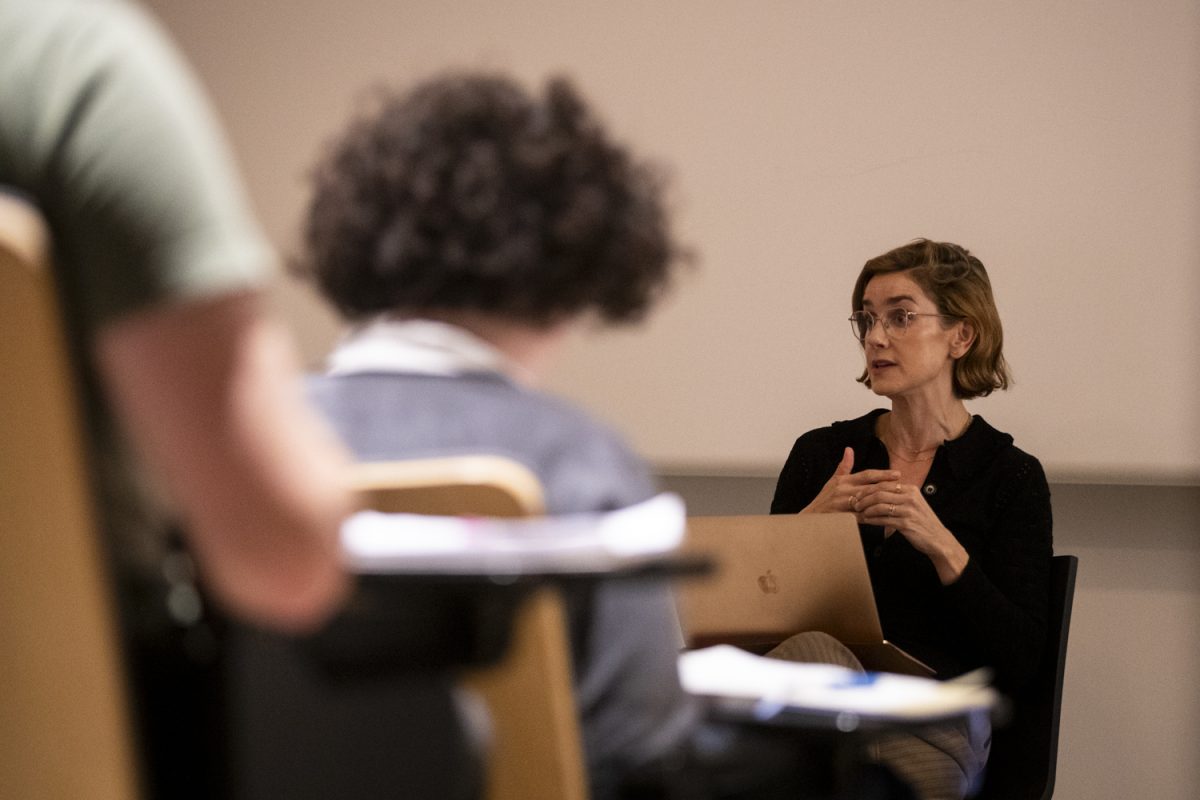Gina Welch is a screenwriter, producer, and author who graduated from Yale University in 2001. She currently teaches English at George Washington University. She is a producer of “Castle Rock,” “Feud,” and “The Terror,” and she was the showrunner of the sports docudrama miniseries “Clipped.” In 2010, she wrote her nonfiction book, “In the Land of Believers: An Outsider’s Extraordinary Journey into the Heart of the Evangelical Church.”
From Oct. 21 to 25, she was a guest lecturer for the University of Iowa’s screening-based course, Iowa Writers’ Room: The Big Binge, during which she screened and analyzed “Clipped.”
The Daily Iowan: As a previous English and creative writing major, what was the process like of translating your creative writing skills to screenwriting?
Welch: I did an MFA in creative writing, and my concentration was fiction. Then I wrote a nonfiction book. During that period working in prose, I was learning how to write sentences and to think deeply about a subject and find something to say about it from my point of view.
When I moved to television, I had to learn a whole new form. You’re working with images in addition to working with text. And generally, you’re working toward a point where you may not even need text to communicate an emotion or an idea. I think the foundation that I had as a prose writer in terms of understanding how to work with language served me [in] the transition.
How was the process of taking what you know about fiction and applying it to nonfiction?
Fiction contains multitudes in terms of genre, but the nonfiction that I read and admire has a novelist’s approach to character. I remember loving and admiring “Random Family” by Adrian Nicole LeBlanc. That book cracked open my understanding of American life through the exploration of characters. That’s how I approach television; it’s always through character. It’s never through plot.
I’m such a fiend for dialogue. That’s kind of my ability. Where I have deficits in story and structure, I have strengths when it comes to dialogue. But nonfiction is often consumed for information rather than as a pleasurable reading experience. And so there’s the expectation when you write a piece of nonfiction that you’re an expert on a subject when your experience is like, “I just did my research to tell the story. I didn’t write the encyclopedia on this subject.” So, it brings a unique set of challenges with it.
In the UI’s Big Binge course, you are lecturing students on “Clipped.” What was your favorite moment of participating in the production of “Clipped”?
Writing and shooting the scene in which the players are deciding whether or not to boycott in episode three. That was my favorite moment in the writers’ room, my favorite moment in production, and one of my favorite scenes in the show. It’s a scene that should not work. It’s too long. It is unusually long for a television show. It’s about seven minutes, and it doesn’t have a discernible shape. It’s not a pro-con debate. And it is much heavier than a lot of the other material in the show, and yet I think you can’t take your eyes away from it. It represents all of these different points of view on the team about whether or not the Clippers have a responsibility to boycott or whether or not it shouldn’t be their job at all to have a response. Nobody’s right.
When you are on a set, how do you make sure that what is on the page translates to what is seen in the images, and how do you maintain the integrity of that process?
It requires this sort of dual nature. You have to be solid in knowing what the show needs to accomplish, thematically and tonally. You have to defend who you know the characters to be. You have to make sure everything is cohesive according to a vision. And you also have to be incredibly porous and fluid to serendipity about what’s happening and what’s discovered on set.
I mean, if you’re there only to defend what you’ve already written in the script, you’re going to miss a lot, and you’re also going to be rigid when you find something that’s not working, rather than thinking in a kind of improvisational manner: “This isn’t working. What else can we try right now? We have two minutes to finish the scene. What else can we try?” You have to pay attention to all of it, and it’s impossible work for one person. Your partners, fellow producers, your director, and hopefully your writers are with you on set. Everybody is alive to whether or not you’re getting the best footage that you need to edit.
What is your biggest piece of advice for rising screenwriters?
I’m trying to come up with a way of saying something that sounds so unsexy no young writer wants to hear, which is that it requires a phenomenal amount of persistence through failure. Almost every writer I know struggled financially, struggled with drafts that weren’t working, struggled to land on the right material that could be the best vessel for their potential, and struggled to find the right partners to work with. What everybody has in common is that they kept going. It can be really hard when you’re young and impatient to say, “It’s not happening now, but it will, and I’m going to keep investing time.”



